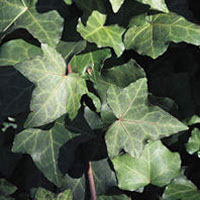Ivy Leaf
 © Martin Wall
© Martin WallHow It Works
Although ivy’s composition has not been subject to detailed scientific investigations, it is known to contain 5–8% saponins.5 Other constituents in the leaf include an alkaloid called emetine that is similar to one found in the herb tylophora. Although emetine typically induces vomiting, in ivy leaf it seems to increase the secretion of mucus in the lungs. While the emetine content is very low in ivy, this could in part explain its traditional use as an expectorant (a substance that promotes the removal of mucous from the respiratory tract).6 Animal studies have shown the saponins found in ivy extract prevent the spasm of muscles in the bronchial area.7
While very few human clinical trials have been performed on ivy, a controlled trial in a group of children with bronchial asthma found that 25 drops of ivy leaf extract given twice per day was effective in improving airflow into the lungs after only three days of use.8 However, the incidence of cough and shortness of breath symptoms did not change during the short trial period. Ivy leaf is approved by the German Commission E for use against chronic inflammatory bronchial conditions and productive coughs due to its actions as an expectorant.9 One double-blind human trial found ivy leaf to be as effective as the drug ambroxol for treating the symptoms of chronic bronchitis.10
In addition to the use of ivy to treat asthma, clinical reports from Europe suggest that topical cream preparations containing ivy, horsetail, and lady’s mantle are beneficial in reducing, although not eliminating, skin stretch marks.11
How to Use It
Standardized ivy leaf extract can be taken by itself or in water at 25 drops twice per day as a supportive treatment for children with asthma.12 At least double this amount may be necessary to benefit adults with asthma. However, ivy is not intended to replace standard medical therapies and should only be used following consultation with a healthcare professional. A similar amount can be used for people with a cough or bronchitis.
Copyright © 2026 TraceGains, Inc. All rights reserved.
Learn more about TraceGains, the company.
The information presented by TraceGains is for informational purposes only. It is based on scientific studies (human, animal, or in vitro), clinical experience, or traditional usage as cited in each article. The results reported may not necessarily occur in all individuals. Self-treatment is not recommended for life-threatening conditions that require medical treatment under a doctor's care. For many of the conditions discussed, treatment with prescription or over the counter medication is also available. Consult your doctor, practitioner, and/or pharmacist for any health problem and before using any supplements or before making any changes in prescribed medications. Information expires December 2026.
